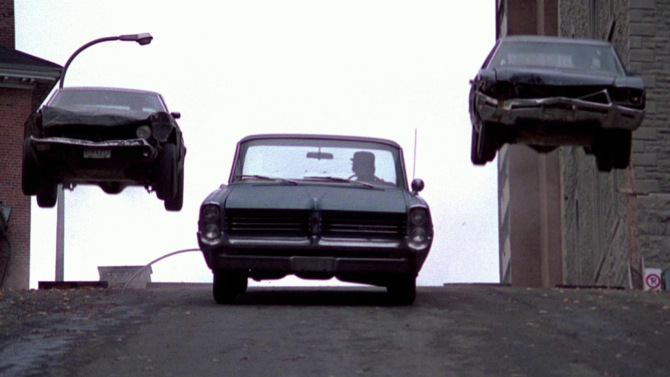
Montreal Magnum
When it comes to car chase scenes, the one that is always highlighted, and for good reason, is from Peter Yates’ 1968 action thriller Bullitt starring Steve McQueen... but some eight years later, the city of San Francisco was replaced by Montreal, Quebec in this little known Italian production with quite the epic speedy sequence of its own, Shadows in an Empty Room (1976), directed by Alberto De Martino. Fusing this touch of Bullitt with a Dirty Harry style storyline – hence why it is called Blazing Magnum in some markets (including the UK), while also including a hint of the ever popular at the time 70s giallo for some murder mystery elements, the narrative follows gritty, hard as nails Ottawa cop Capt. Tony Saitta (Stuart Whitman) as he dispatches some bank robbers in his own city... before getting the tragic call that his much younger sister, Louise (Carole Laure – Sweet Movie), who lives in Montreal, has died under very suspicious circumstances.
-

Uncharted Waters
UnchartedJune 28, 2022There is no denying that I went into 2022's Uncharted, directed by Ruben Fleischer, with rather low expectations... let’s face it, there isn’t a great track record for film adaptations of video games, but somehow this one felt surprisingly enjoyable. Clearly in the vein of many a classic adventure film – think the Indiana Jones franchise, The Mummy (but not the 1930s or Tom Cruise iterations), the original Pirates of the Caribbean, Treasure Island and National Treasure, there is no chance that this will ever reach those sky-high heights, but it does entertainingly fill the gap while we wait for next great adventure flick.
-

Cancel Cruise Control
Top Gun: MaverickJune 21, 2022Like a big old slice of Americana, Top Gun: Maverick throttles us back onto the ‘highway to the danger zone’ a whopping thirty six years after the original was released in 1986. Helmed by Joseph Kosinski (Oblivion), it harkens to a time when men were men, box office success screamed for pro-American storylines (for example, Rocky IV – which was released just a year earlier in 1985), and Tom Cruise was a bankable movie star (I guess some things haven’t changed). Oozing a most unique brand of joyous buoyancy, this sequel will likely find you grinning from ear to ear through large portions of the action seen onscreen. Following the titular Maverick (Cruise), not much has changed for the talented pilot. Never having progressed past the ranking of Capt., his call sign is aptly given... as his maverick ways have always hindered him from moving up the ranks.
-
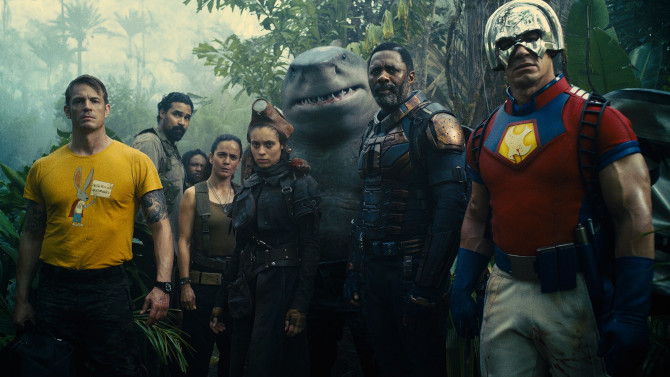
The Awkward Squad
The Suicide SquadSeptember 6, 2021What do you get when you hand The Suicide Squad reins over (with carte blanche, I might add) to James Gunn.? .? .? an R rated, Guardians of the Galaxy-like extravaganza that dusts curse-laden comedy over the somber DC verse, throwing pails of blood (and even a few blink and you’ll miss it pieces of male and female anatomy) at the screen to wash away its predecessor’s flat formula. Going ‘out-there’, and that’s saying something for this type of feature, Gunn’s gonzo, go-for-broke style finds intelligence spook Amanda Waller (Viola Davis) sending two teams, or should I say squads, of suiciders onto the island of Corto Maltese – a country that has just seen a coup take out their leader, replaced by a non-American ally. Wave one finds Colonel Rick Flag (Joel Kinnaman); daddy’s lil monster Harley Quinn (Margot Robbie); Captain Boomerang (Jai Courtney); long haired Savant (Michael Rooker); piecemeal T.D.K. (Nathan Fillion); Blackguard (Pete Davidson); a javelin carrying guy who is aptly named Javelin (Flula Borg); and, without further ado, a human-flesh loving walking Weasel (Sean Gunn – he also makes a cameo as prisoner Calendar Man).
-
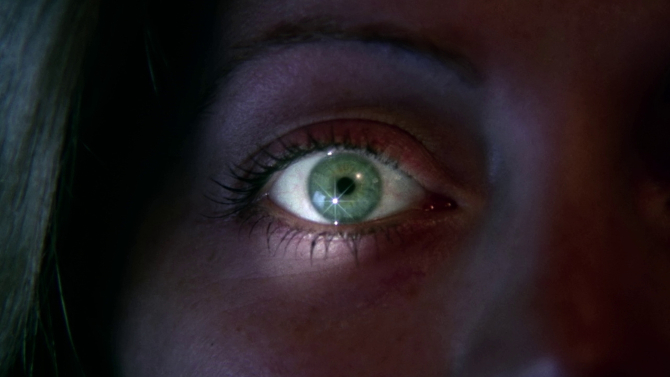
What Could Have Been: Death Has Blue Eyes
May 5, 2021Next time you see your friends, you might just want to take a gander into their peepers, for if we learn one thing in today’s feature, it’s that Death Has Blue Eyes (aka The Girl Is a Bomb). A 1976 Greek film written and directed by first time film maker Nico Mastorakis (though his more famous cult classic Island of Death was released first, it was in fact made second), this one is a mish-mash of C movie ideas rolled into a honey-trap of underwhelming baklava (sadly, the Greek pastry does not make an appearance in the flick). Feeding off of the James Bond and giallo craze of the time (as well as any other genre they could pop in), financed by the porn king of Greece, and with a budget so low that the writer/director would not earn one penny (or should I say drachma), in the end, it does intriguingly share some similarities with Brian De Palma’s Carrie – which was released the same year as this one. Keep in mind, perhaps, the fact that this is arguably the first supernatural film to be made in Greece – so maybe we can be kind in saying that it has a good concept that just isn’t executed particularly well.
-
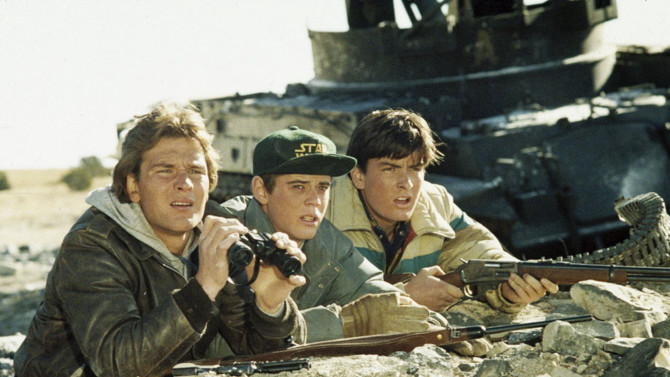
Dawn of the Dread
Red DawnApril 25, 20211984's Red Dawn, adapted for the screen and directed by John Milius, has been called many things – ‘the most right-wing blockbuster ever made’, ‘the most violent movie ever made’. . . but, by today’s standards, it is hard to take all of this too seriously (especially that latter statement – things have gotten a whole lot bloodier as time has gone by). An entertaining (if outrageous) B-style movie premise that pulls from old westerns (think High Noon, Rio Bravo and The Cowboys) and guerrilla warfare tactics, this version of 1989 (it is set five years in the future) finds a secret Russian, Cuban, and Nicaraguan alliance bringing with it an unexpected invasion of the United States. . . seen specifically in Calumet, Colorado (this the beginnings of World War III).
-
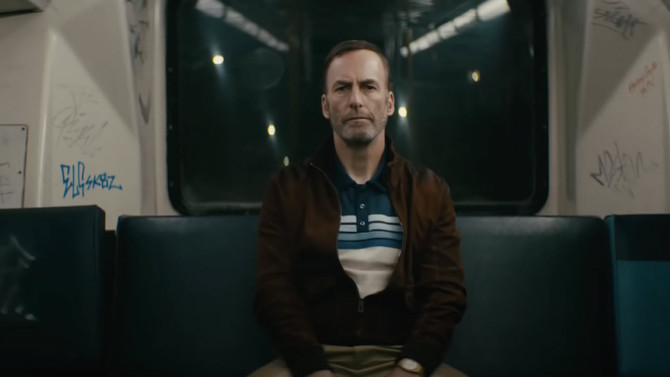
Nowhere Man
NobodyMarch 27, 2021“He’s a real nowhere man, sitting in his nowhere land, making all his nowhere plans for nobody. Doesn’t have a point of view, knows not where he’s going to. . .”. A slightly abridged version of the first verse and chorus of The Beatles’ iconic song “Nowhere Man”, these mesmeric lyrics tell the tale of a man afloat in his life with no anchor – lacking the passion, drive, and spirit to make him truly whole. Very much akin to the central character in 2021's Nobody, an action packed film written by Derek Kolstad (the scribe behind the John Wick franchise) and directed by Ilya Naishuller, Hutch Mansell (Bob Odenkirk), is suffering from middle class (and aged) ennui. Though that last statement may sound more like something from Mike Nichols’ The Graduate than an action packed extravaganza, this is a far cry from a character drama.
